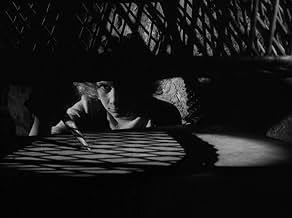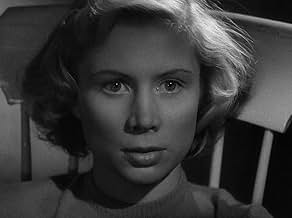Fängelse
- 1949
- 1 घं 19 मि
IMDb रेटिंग
6.7/10
2.2 हज़ार
आपकी रेटिंग
अपनी भाषा में प्लॉट जोड़ेंA film director tries to create the best film in history, but finds out that human abilities have their limits.A film director tries to create the best film in history, but finds out that human abilities have their limits.A film director tries to create the best film in history, but finds out that human abilities have their limits.
Birgit Lindkvist
- Anna
- (as Bibi Lindkvist)
John W. Björling
- Man in Birgitta's Dream
- (बिना क्रेडिट के)
Sven Björling
- Filmworker at Film Studio
- (बिना क्रेडिट के)
Anita Blom
- Anna
- (बिना क्रेडिट के)
Britta Brunius
- Lasse's Mother
- (बिना क्रेडिट के)
Åke Engfeldt
- Police Officer
- (बिना क्रेडिट के)
Gösta Ericsson
- Police Officer
- (बिना क्रेडिट के)
Kenne Fant
- Arne
- (बिना क्रेडिट के)
कहानी
क्या आपको पता है
- ट्रिवियाIngmar Bergman's first film based on his own original screenplay.
- क्रेज़ी क्रेडिटThere are no opening titles in this film. An unseen narrator (Hasse Ekman) reads the credits, as well as the title, out loud approximately ten minutes in to the movie. The sole title card is the standard "Slut" (Swedish for "End") that closes the picture.
- कनेक्शनEdited into Histoire(s) du cinéma: Une histoire seule (1989)
- साउंडट्रैकDrömmen
Composed by Erland von Koch (1949)
फीचर्ड रिव्यू
This is the earliest Bergman film that I've watched, and already the prime concerns that occupied him throughout most of his career - human relationships, sex, faith, death, etc. - are well in evidence.
Interestingly, the narrative is set against a motion-picture backdrop; in fact, the film demonstrates a self-conscious approach to the medium that would re-emerge in later efforts such as PERSONA (1966) and THE PASSION OF ANNA (1969): rather than observing the normal procedure for the time, the credits don't appear at the outset but, effectively interrupting the proceedings after the first reel, these are given in a voice-over! Besides, the plot seems to be following the interconnecting vicissitudes of a variety of characters - but chiefly the crisis facing two separate couples - all of which, somewhat murkily and pretentiously, serves as a morality play about the triumph of Evil over Good, as envisioned in a framework set inside a studio and involving a film director's old ex-professor (the former happens to be the elder brother of one of the characters in the main narrative!).
It's all rather fascinating for much of the running-time - and the director's visual style really can't be faulted (a dream sequence is especially effective and there's even a short and quite amusing Silent slapstick film-within-a-film, ostensibly the amateurish work of one of the characters!) - but, eventually, the over-ambitious structure of PRISON (by the way, neither this vague title nor the equally well-known alternate given the film on its American release, THE DEVIL'S WANTON, really serve the purpose of its existentialist theme and generally introspective tone), to say nothing of the relentless gloominess, wear the whole down somewhat. All in all, however, it's a fine piece of work from a film-maker who would go on to become one of the leading forces in cinema during the second half of the 20th century.
Interestingly, the narrative is set against a motion-picture backdrop; in fact, the film demonstrates a self-conscious approach to the medium that would re-emerge in later efforts such as PERSONA (1966) and THE PASSION OF ANNA (1969): rather than observing the normal procedure for the time, the credits don't appear at the outset but, effectively interrupting the proceedings after the first reel, these are given in a voice-over! Besides, the plot seems to be following the interconnecting vicissitudes of a variety of characters - but chiefly the crisis facing two separate couples - all of which, somewhat murkily and pretentiously, serves as a morality play about the triumph of Evil over Good, as envisioned in a framework set inside a studio and involving a film director's old ex-professor (the former happens to be the elder brother of one of the characters in the main narrative!).
It's all rather fascinating for much of the running-time - and the director's visual style really can't be faulted (a dream sequence is especially effective and there's even a short and quite amusing Silent slapstick film-within-a-film, ostensibly the amateurish work of one of the characters!) - but, eventually, the over-ambitious structure of PRISON (by the way, neither this vague title nor the equally well-known alternate given the film on its American release, THE DEVIL'S WANTON, really serve the purpose of its existentialist theme and generally introspective tone), to say nothing of the relentless gloominess, wear the whole down somewhat. All in all, however, it's a fine piece of work from a film-maker who would go on to become one of the leading forces in cinema during the second half of the 20th century.
- Bunuel1976
- 11 मार्च 2007
- परमालिंक
टॉप पसंद
रेटिंग देने के लिए साइन-इन करें और वैयक्तिकृत सुझावों के लिए वॉचलिस्ट करें
- How long is Prison?Alexa द्वारा संचालित
विवरण
बॉक्स ऑफ़िस
- बजट
- SEK 2,40,000(अनुमानित)
- चलने की अवधि1 घंटा 19 मिनट
- रंग
- ध्वनि मिश्रण
- पक्ष अनुपात
- 1.33 : 1
इस पेज में योगदान दें
किसी बदलाव का सुझाव दें या अनुपलब्ध कॉन्टेंट जोड़ें

































